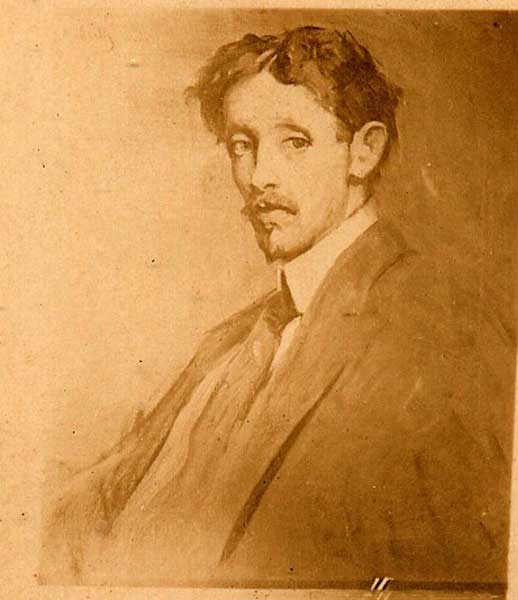
Sampling of work by
Phineas Paist
|
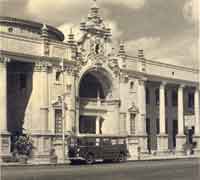
Colonnade
building
Photo by Paist
Date?
|
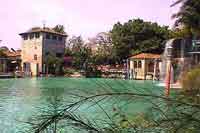
Coral
Gables Venetian Pool
1924 |
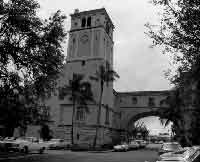
Coral
Gables Douglas Rd Entrance
1925
|
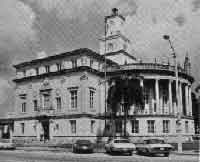
Coral
Gables City Hall
1927-28
|
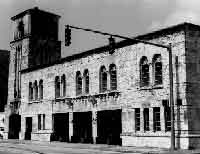
Coral
Gables Police and Fire Station
1939
|
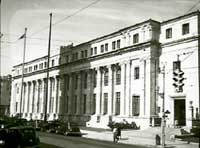
Miami
Federal Court House
Date?
|

Florida
Home
1937?
Built 1939
|
|
|
Phineas Paist
1904-1910?
(Photo of painting)
Artist?
Owner?
Size?
Jpg: Michael Turbeville
Vizcaya
Phineas
P. Paist (1873-1937) worked closely under Paul
Chalfin during the contruction of James Deerings summer home Vizcaya

Vizcaya
From: Michael
Turbeville
t ur bo9@verizon.net
Date: Thu, 01 Sep 2005
(c)
Copyright 2005
Printed
by permission
Phineas is responsible for the original design for the University of
Miami, as well as the Florida pavilion at the Chicago
Worlds Fair 33/34 also the Florida pavilion at the 39 Worlds Fair the
largest participation by any state in this nation, although he
passed in 37, he deserves all the credit for it and possibly the
modern designs termed modernity see the "Florida
Home" at
Chicago Worlds Fair.
Sat, 03 Sep 2005
At the time of Deerings watercolor [thumbnail "Fountain"] Paist was
47, I don't think I have a photo of Paist in 1917, but I do have a pic
done in 1920, 3 years later, and Paist is considerably older than the
photo of Paist (with Deering?), which I think dates to 1907.
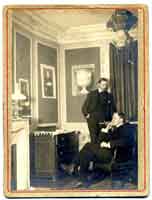
Phineas Paist with possibly James
Deering?
1907?
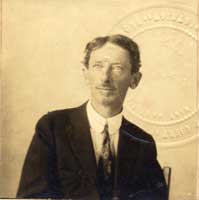
Phineas
Paist
1920
Sun, 11 Sep 2005
PHINEAS
P. PAIST was 64 at the time of his death at Miami in 1937.
By 1893 the 20 year old Phineas was working for Philadelphia architect
S. Gifford Slocum, and also in Cleveland as a draftsman for Architect
Charles Schweinfurth. Around 1893 Paist will begin his association with
G.W. and H.D. Hewitt
The 1893
World Columbian exposition in Chicago was later to have a strong
influence on him. Attending school after work In april of 1896 at
Drexel Institute of science and industry, Paist wins first prize in the
evening architectural water-color class , winning him $10 from Drexel
president James Mac Alister. In 1897-98 Phineas exhibited at the
Drexel School, a large watercolor rendering of the Hall of
Machinery from the 1893 Chicago Fair.
The 1893 exposition will start a life long interest in world’s fairs.
Later in life he and his partner Harold Steward will create the
Florida Pavilion at the 1933 Chicago WF where they present the modern Florida home a design by associate
architect Robert law Weed a modern designer show house that featured
the works of many modernist designers of the 30's. Also on the drawing
board at his death in 1937, the design for the Florida exhibit, at the
1939 New York worlds fair. It was the largest participation by any
state in the nation.
On August 19th 1904 he is second holder in the Pennsylvania Academy’s
Scholarship in architecture, and is afforded a farewell dinner at the
Manheim Cricket Club. This is a good year for the 31 yr. old
Phineas. This 1904 award sends Paist and wife Anna to Paris where
they will live while Phineas attends the Ecole De Beaux Arts, thru the
Atteliers of Chifflot and Duquesne. 1905 Paists tour is extended until
1906. Walking in the masters footsteps,
It is in
this time
period that I think Paist may be acquainted with John S. Sargent.
The missing portrait of Paist [featured above], I believe is done at
this time.
(Editor's Note - Michael thought the
above painting - which is an image of an old photo of a painting now
unlocated -- might have been by JS
Sargent)
1905 and 1906 proves to be a very productive time for Phineas, he
travels and paints in Plein air profusely and produces hundreds of
small landscapes and Architectural renderings. These small paintings
and watercolors will remain un-discovered for 85 years. Paists
classical skillful watercolor renderings and plein airs will prove to
be a window into the mind of this un-recognized American post
impressionist painter.
Around 1920 in Miami Phineas will evolve from his association at the Deering estate [Vizcaya] to become a
city planner and lord of architecture for The Coral Gables Plantation
heir George Merrick.
Phineas Paists contributions of the Douglas
entrance, the Police and Fire
Station bldg. and the new Miami
Federal Courthouse
will prove to be a unique collection of buildings in the Beaux
Arts Style,
Paists architectural styles make Coral Gables unique in all of America,
as a city planed and overseen by an Ecole
des Beaux Arts
architect. Other cities like Boston, Chicago, New York and Washington
can only boast of individual buildings, by Ecole des Beaux Arts
architects, not a whole city plan as in CG. Along with the dozens of
homes, City and Federal buildings Paist will design, a regretfully
never realized original plan for the University of the Sun ... the
University of Miami.
After Returning from Paris to Philadelphia in 1906 Phineas continues to
pursue a career in architecture for the firm of G.W. and W.D. Hewitt
which in 1906 becomes Hewitt Stevens and Paist. His wife Anna will
start the first Montessori school in Bucks County
PA. after her return from Italy. In Philadelphia his work continues for
George C. Boldt a hotel man (Waldolf Astoria) and owner of the
Heart Island Castle on the St. Lawrence seaway, which was built by the
Hewitts and Paist also the Willard hotel in Washington and additions to
the Bellevue Stratford in Phil. By 1915 Paist has closed his office in
Philadelphia and will move to Miami leaving for what his wife believes
to only be a short time ... to live and work for Paul Chalfin at James
Deerings Villa Viscaya.
He will live in Miami until his death in 1937. By 1926 besides the City
Hall, the Colonade building The Venitian Pool, Mr. Paist had designed for George
Merrick a plan for an Arts and Crafts center in the Gables to rival
what Elbert Hubbard of the Roycroft Shops of East Aurora, and what
William Morris of Hammersmith England or what Fredrick L. Seely had
ccomplished in the Biltmore industries at Asheville. All of these plans
crumbled after the Hurricane of 26 and the following crash of 1929.
* * *
I
am probably jumping the gun declaring Paist deserves credit for the
moderne styles but by 1931 Paist and Steward had just completed
The Miami Federal Courthouse.
Phineas now in his 60's had been
considered a god of Classical building styles.
The firm of Paist and
Steward lost profit on the courthouse project due to faulty building
materials. However the 1933 worlds fair project the Florida Home in the
post depression era suggest a deeper interest in newer architectural
styles and construction techniques such as cast cantilevered roofs,
ship railing etc seen at Chicago set in play by the work of Robert law
Weed at the Florida Home, overseen by Paist and Steward.
Notes
Special
thanks to Michael Turbeville, a friend of the
JSS Gallery, for sending us this image of a watercolor of
Vizcaya
|
|
Sampling of work by
Phineas Paist
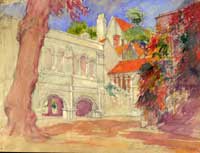
Inviting
Entrance
Watercolor & pencil
1904
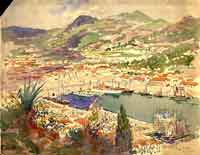
Harbor
in Nice, France
Watercolor & pencil
1905
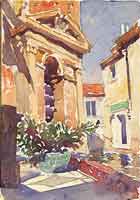
Italy
1904-1906
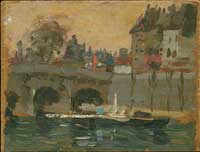
Bridge Scene
1905-1906
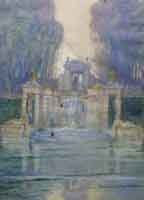
Fountain
Watercolor
after 1910?
|

